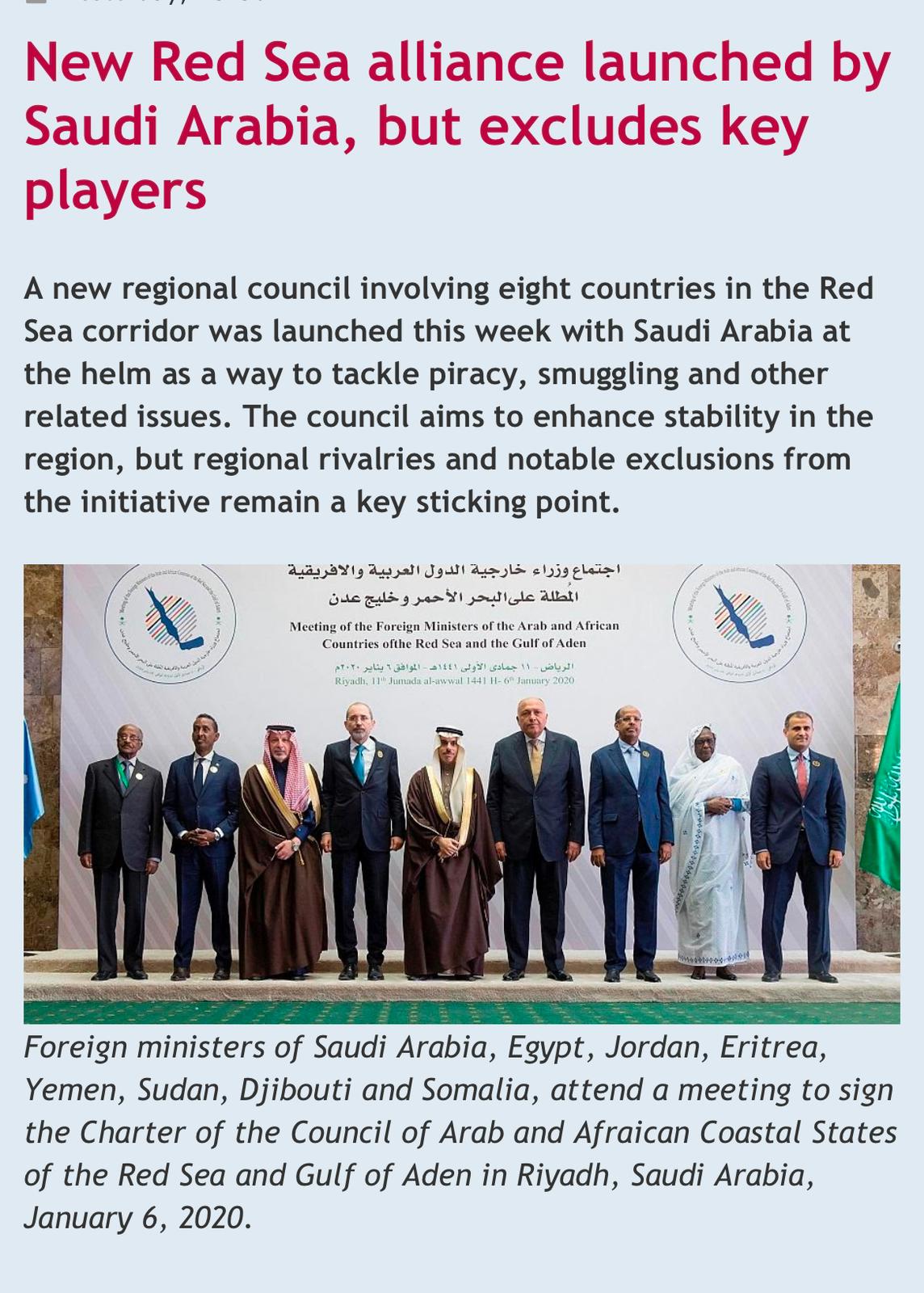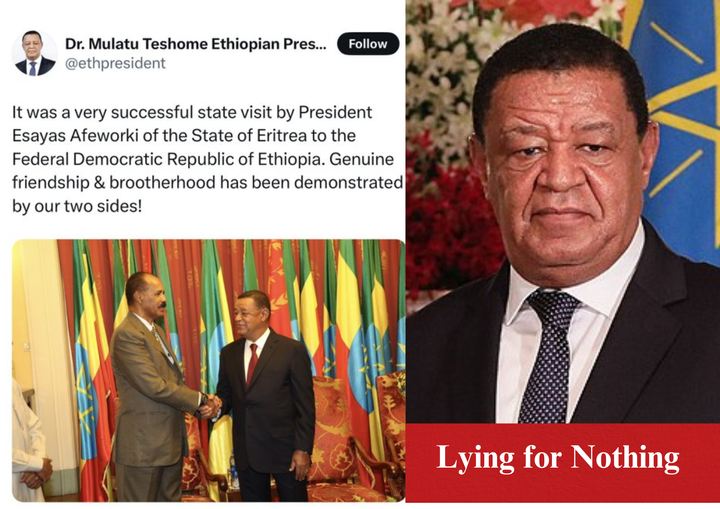Abiy Ahmed Ali’s Failed Leadership Turns to Wag the Dog Strategy
Abiy Ahmed's leadership crumbles, marred by missteps and questionable motives in a turbulent Ethiopia, casting a shadow on regional stability

Background: On October 13, 2023, Prime Minister Abiy Ahmed Ali addressed the Ethiopian Parliament, with his speech centered on the critical matter of Ethiopia's access to the sea. However, this address has raised concerns about its potential implications for Eritrean sovereignty and its potential to perpetuate tension and conflict.
The matter of Ethiopia's access to the sea was never a concern for Eritrea since Eritrea has consistently welcomed the concept of Ethiopia utilizing its seaports. Ethiopian authorities declined to utilize Eritrean ports and instead opted for Djibouti and other options.
Nevertheless, this context is developing amid profound economic, political, and societal difficulties in Ethiopia, aggravated by mounting ethnic animosities with the potential to transform into a full-blown civil conflict. Consequently, Abiy's intentions have come under scrutiny, as his actions seem to favor confrontation with Eritrea over the course of reconciliation and stability.

Prime Minister Abiy Ahmed Ali a Failed Leader
Abiy Ahmed is a failed leader. The reason is that he came to power when Ethiopia faced imminent disintegration. After years of TPLF’s aggression, the people of Ethiopia in every corner of the country revolted. Without central leadership, Ethiopia was headed to a civil war at worst and disintegration at best.
During the period from 2016 to 2018, a continuous and widespread protest movement significantly disrupted Ethiopia and the TPLF-led EPRDF, which was the core of the ruling coalition. The upheaval made it increasingly clear that the existing government was no longer sustainable, eventually paving the way for Abiy Ahmed Ali, an Oromo leader representing the largest ethnic group, to take power in conjunction with the second-largest group, the Amhara. Following a series of extensive protests, the TPLF-led government in Ethiopia was ousted, and a reformist faction emerged from within the ruling party to assume leadership. Abiy Ahmed, a relatively unknown intelligence officer with a diverse background, ascended as the charismatic and visionary young leader who would gain broad approval.
The Ethiopian population sought stability and leadership that promoted nationalism. They yearned for internal harmony and aspired to achieve regional peace and economic integration. Abiy articulated the right words and took necessary actions that instilled hope in Ethiopia, the global community, the region, and particularly the Eritrean people. His initiatives reinvigorated Ethiopia, and once he openly expressed his commitment to achieving peace with Eritrea, Eritrea reciprocated.
Abiy entered into a peace agreement with Eritrea, acknowledging Eritrean territories and committing to regional integration, propelling the region forward. Eritrea, Ethiopia, and Somalia signed a peace agreement, marking a historic moment in the region as the concept of peace and regional integration became attainable for the first time.
However, all of this was a facade, a means to attain and maintain power by deceiving the people of Ethiopia and Eritrea. Over the course of five years, he altered his stances, took action, and employed strategies that demonstrated his lack of commitment to the truth and the promises he had made. In doing so, he completely eroded the trust and goodwill of both the Ethiopian and Eritrean populations.
What were Abiy's falsehoods?
In 2019-20, Ethiopia faced a critical juncture. The TPLF had pushed Ethiopia into a state of readiness for war, exerting control over 80% of the Ethiopian military stationed in Tigray to wage hostilities against Eritrea. The TPLF posed a significant threat to Abiy Ahmed's authority and the stability of Ethiopia, making its intentions to attack Eritrea abundantly clear.
Abiy's administration lacked the military capacity to effectively counter the TPLF, thus necessitating the support of Eritrea and the people of Ethiopia, particularly the Amhara. When the TPLF attacked Ethiopian military forces and gained control, forcing thousands of Ethiopian troops to flee to Eritrea, Eritrea extended its hand, offering refuge, sustenance, and rearmament to these displaced soldiers.
The Ethiopian military, the people of Ethiopia, especially those from the Amhara region, armed themselves and, in cooperation with Eritrea, conducted a military campaign that humiliated the TPLF and drove them out of the city of Mekele. Key TPLF leaders were either killed or captured.
However, under pressure from Washington, Abiy halted the military campaign and allowed the TPLF to harass Eritrea and Ethiopia again. During that time, Abiy praised Eritrea for rescuing Ethiopia and declared the nation indebted to Eritrea for its salvation.
The TPLF reignited their offensive, focusing their attacks on the Amhara and Afar regions and further extending the conflict into the heart of Ethiopia. This resulted in extensive instability and internal displacement.
The TPLF gained control over several major cities in the Amhara and Afar regions, inflicting significant casualties on the people of Afar and waging a destructive war that claimed the lives of millions. The TPLF also perpetrated crimes against humanity while falsely claiming genocide against the people of Tigray.
The Amhara suffered immense losses, with millions displaced and thousands of Afaris repeatedly losing their lives. Vast swathes of the Amhara region fell under TPLF control. During this period, Ethiopians and Eritreans in both the diaspora and the region joined forces, hoping to defeat the TPLF, which had caused widespread devastation with support from Western nations. Eritreans and members of the Ethiopian diaspora united to advocate in Washington and Western nations, urging them to cease assisting the TPLF and initiating the global "No More" movement.
During this time, Abiy made a series of major errors that profoundly impacted the people. He gaslighted Ethiopians who were enthusiastic and prepared to demonstrate their unity in Ethiopia. Millions of Ethiopians were eager to unite to show solidarity and countless diaspora members returned to Ethiopia for this purpose. However, unexpectedly, Abiy released the notorious TPLF leaders from prison and prevented millions from expressing their unity in Addis Ababa.
This move shocked Ethiopians and Eritreans alike. Ethiopians, especially the Amhara community, began publicly questioning Abiy, challenging his leadership, and launching campaigns against him.
In the end, after numerous battles, when the TPLF was surrounded and left with no choice but to surrender, Abiy Ahmed, under pressure from Washington, saved the TPLF. Abiy signed the Pretoria Agreement, essentially giving the TPLF a lifeline to continue. Meanwhile, the assault on the people of Amhara continued unabated.
The Amhara population fell under assault by other ethnic groups while the Abiy administration remained quiet. Ethiopian military is accused of complicity in the atrocities taking place against the Amhara. Furthermore, the displacement and atrocities against the Amharas continued, threatening civil war in Ethiopia. In the meantime, Abiy Ahmed kept insisting the Amhara Fano’s disarm while the TPLF was getting support and arms from the West.
Today, the pretoria agreement is unrecognizable. The Amhra’s and Afars are suffering, while the TPLF is receiving preferential treatment, acting as a nation meeting with foreign diplomatic missions. The State Department has made Tigray their favored destination.
Had PM Abiy Ahmed resolved the TPLF situation, Ethiopia could have moved positively towards regional integration and started exploiting its human and natural resources. Instead, Abiy allowed Washington to dictate terms and conditions that made Ethiopia a hostage and dependent.
Opportunities and Time Squandered
Abiy Ahmed's leadership was a substantial letdown for Ethiopia, Eritrea, and the entire region. He missed a significant opportunity to rid Ethiopia of the TPLF and establish a more stable foundation following the initial offensive that saw Ethiopia capture Mekelle and its leaders.
Abiy frittered away the goodwill and political support he had acquired from the Ethiopian populace due to his hesitations and attempts to curry favor with Washington.
He made empty promises to the Eritrean people, asserting he was forever indebted to them when his actions contradicted his words. He let down the people of Amhara and Afar, rejecting the pleas of Ethiopians both inside and outside the country. These individuals tirelessly advocated on his behalf throughout the Western world, investing countless hours promoting Ethiopia, only for him to turn around and allow harm to befall their communities.
As a result, Abiy lost the support of a significant portion of the Ethiopian population and Eritreans. His international recognition as a Nobel Prize laureate came at the cost of destroying the hopes and aspirations of people in the region through his deceptive actions. Ethiopians and the broader region should have taken advantage of substantial economic opportunities and precious time. Eritrea and Ethiopia are friends with Russia and are part of the Belt and Road initiative. Abiy Ahmed is now a hindrance.
Why Target Eritrea, and What Could Be the Potential Motives?
Abiy Ahmed's misguided speech to the Ethiopian parliament is remarkable for several reasons. Firstly, it stands out because he convened the parliament to express this significant perspective as his personal belief. Secondly, he emphasized the vital role of water in supporting life, underscoring its existential significance. He staunchly asserted that Ethiopia must obtain access to water by any means necessary, regardless of the duration it may take. In the process, he initiated an enduring conflict with Eritrea. The question that arises is, why?
A) To Fragment Amhara Unity: Abiy may believe that by pushing the narrative of Ethiopia's need for access to the sea, he can fracture the united front against him stemming from the Amhara region. This strategy aims to divide those who are resolute about Ethiopia's access to the sea from those who are more pragmatic and recognize Eritrea as a sovereign nation.
B) To Advance His Broader Oromo Goals: Reports suggest that Abiy has discussed his ambitions with select Oromo nationals even before the conflict with the TPLF. These ambitions involve creating a greater Oromo nation with access to the sea.
C) To Accommodate Washington and Western Interests: Washington has historically been wary of a trilateral agreement involving Eritrea, Somalia, and Ethiopia. They have also been cautious about strengthening Ethiopia and Eritrea's security and economic partnership. Influencing Ethiopian politics allows Washington to curtail China’s Belt and Road plans and Russian influence in the region.
D) To Rally Ethiopia Behind a Unifying Agenda: Abiy might be employing a strategy used by his predecessors to unite the Ethiopian populace around a common goal or enemy, mainly since he has been dealing with significant challenges to his leadership. During the opening session of the parliament on Monday, President Sahle-Work Zewde of Ethiopia highlighted that the absence of a cohesive "national narrative" had played a role in the nation's internal conflicts. Sahle-Work underscored, "We have been unable to create a common national narrative capable of promoting unity among us."
Ethiopia, with a population of 120 million and over 80 ethno-linguistic groups, has recently experienced fatal disputes over administrative boundaries and territorial issues.
E) To Alter the Narrative: Abiy has lost the support of Ethiopia because he has squandered many golden opportunities to turn Ethiopia around. Abiy has no majority coalition behind him. Ethiopia is facing unprecedented social, economic, political, and security problems. Moreover, the ethnic clashes could turn into a full-fledged civil war. Hence, he uses the "Wag the Dog" strategy to regain favor and build a coalition of supporters to shift attention and garner backing.

In conclusion, Abiy Ahmed's leadership, initially viewed with promise, has been tarnished by a series of failures. He assumed office during a tumultuous period in Ethiopia, marked by widespread protests and the looming threat of disintegration due to the TPLF's aggression. While he initially presented himself as a unifying and visionary leader, over time, his leadership has lost the trust and support of both Ethiopians and Eritreans.
In summary, Abiy's leadership has faced significant challenges and criticism, leading to what appears to be a "Wag the Dog" strategy aimed at diverting attention and garnering support. This strategy has come at the expense of missed economic growth and stability opportunities for Ethiopia and the region, with severe consequences for the people of both countries.
Abiy's cherry-picking of historical examples to support his argument against Eritrea should serve as a cautionary reminder that those who have challenged the resilience of the Eritrean people in the past did not fare well. His current trajectory aligns with the wrong side of history.
If this information is important to you, please subscribe and donate to help Nefasitpost.com grow.
.




Comments ()